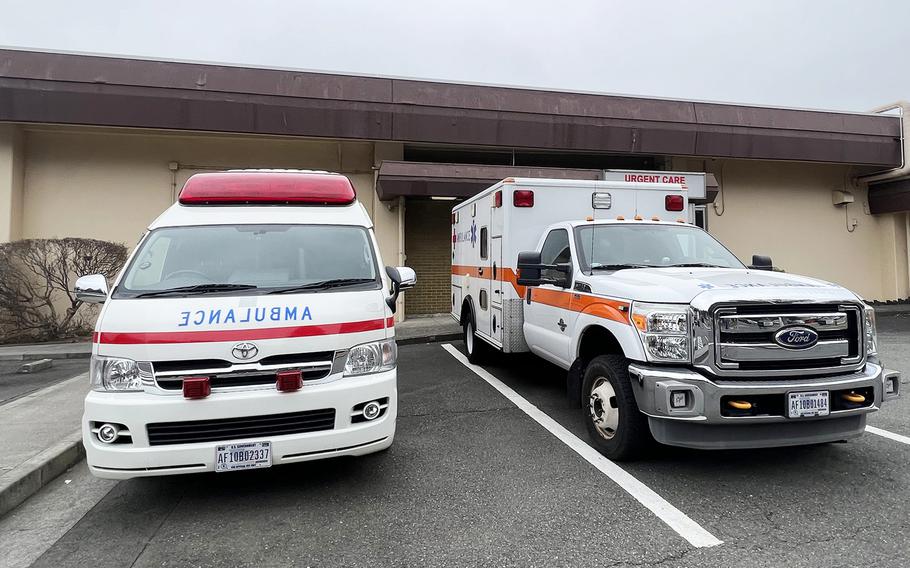
Ambulances park outside the 374th Medical Group’s urgent care entrance at Yokota Air Base, Japan, March 17, 2023. (Kelly Agee/Stars and Stripes)
The Department of Defense announced a one-year pilot program this week in a bid to help 11,000 civilian employees in Japan navigate and defray the cost of medical care in the country.
The free program — the Pilot Health Insurance Enhancement for DOD Civilian Employees in Japan — begins Jan. 1 and runs through Sept. 29, the DOD said in a news release Monday. Civilian employee dependents will not be eligible during the trial period.
It offers access to a call center staffed 24/7 with bilingual representatives who will assist callers with “identifying their needs,” making appointments and issuing payment guarantees upfront, according to the news release.
Spokespeople for DOD and the Defense Health Agency did not immediately respond to email requests for comment and additional details on services on Tuesday in Japan.
Plan participants eligible
Eligible employees may sign up for the program during the Federal Benefits Open Season from Nov. 11 through Dec. 9. The employee must already be enrolled in a participating health plan through the Federal Employees Health Benefits program.
The Office of the Assistant Secretary of Defense for Health Affairs will oversee the pilot, which awarded a $4.2 million contract to International SOS Government Services Inc. — the primary contractor for the Tricare Overseas Program — to begin the program, according to the release.
The contract is funded through the military departments, defense agencies and DOD field activities that have civilian employees in Japan, according to the release.
The pilot follows “a yearlong effort to identify and address concerns regarding access to medical care,” the Pentagon said in its release, apparently referencing complaints raised by angry DOD civilians who turned out in droves in early 2023 to public meetings at U.S. bases in Japan.
At those hearings, visiting Pentagon officials gauged discontent over the Defense Health Agency forcing employees to Japanese providers and limiting civilian access to base hospitals and clinics to a space-available basis only.
In response, civilian employees cited the practice in Japan of paying for health care upfront, a matter sometimes costing tens of thousands of dollars; of sometimes being refused care at Japanese medical facilities; the language and cultural barrier and differing health care practices in Japan.
They also cited deaths that resulted from a lack of or delay in services from military and Japanese providers.
Japanese hospitals are not required by law to accept patients and routinely deny patients at their discretion. Reasons can vary but often pertain to a preference for Japan’s national insurance plan or the belief that they lack adequate resources to treat someone.
Military hospitals will continue to provide space available health care for civilian employees, according to the DOD release.
‘Too little, too late’
The loss of steady access to on-base health care meant some employees relocated from Japan and others decided against taking jobs in the country, according to groups like Japan Civilian Medical Advocacy, a grassroots organization with an online forum for DOD employees to share tips on accessing health care.
While the group views the pilot as a step in the right direction, some members were also quick to note its flaws.
“I think we’re excited to see the Pentagon do something and to acknowledge this as an issue, saying that we are vital and saying we need a program is a good thing,” advocacy group member Alexandra Cummings said by phone Tuesday. “It has a little bit of a ‘too little, maybe too late’ thing for a lot of us, and it’s such a blow that they are not protecting dependents.”
Cummings also felt civilians haven’t had significant input in the development process of the program.
“I think they would be able to create a much better program in partnership with civilians who are impacted and concerned,” she said.
Cummings said the pilot program will likely help civilian employees secure appointments and avoid the burden of coming up with huge amounts of cash in emergency situations, but it doesn’t address concerns over a lack of specialized medicine or some surgeries.
In a personal example, Cummings said she’s sought follow-up care after receiving an emergency embolization following a postpartum hemorrhage to determine if she can have more children or if further pregnancy would pose a risk.
“No Japanese doctor has been willing to see me, and I’ve talked with five different hospitals, because their concern is, even with me providing the American medical records, I’ve been told that the technology that was used on me is not something that’s used frequently in Japan,” she said. “So, I can’t even get an appointment that’s come out through translators.”